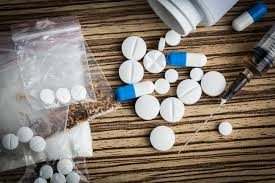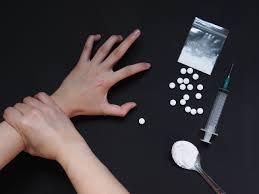Opioid Addiction Symptoms & Withdrawal
Immediate
Placement Available at our Top-Rated Treatment Centers.
Please call us at (855) 410-4488. We work
with most major insurance providers and offer flexible payment
options!
Atrium Addiction Care offers a variety of treatment choices and programs for individuals struggling with drug or alcohol addiction. Our inpatient treatment programs are designed for those who have more severe substance use problems and require 24-hour care. We admit both voluntary and involuntary patients.

Opioid addiction has become a serious public health issue in recent years, affecting millions of people across the world. Opioids are commonly prescribed painkillers that include drugs such taking opioids as oxycodone, hydrocodone, and fentanyl.
While these medications can be effective for managing chronic or acute pain, they also carry a high risk of addiction due to their powerful effects on the brain's reward system. Addiction occurs when an individual becomes physically dependent on opioids and experiences intense cravings for the drug.
This dependence can lead to physical withdrawal symptoms when attempting to quit or reduce usage of other substances. Withdrawal from opioid addiction is often described as one of the most difficult challenges an addict will face, with symptoms ranging from mild discomfort to severe distress.
Understanding opioid addiction symptoms and the opioid withdrawal syndrome is critical for anyone struggling with this condition and seeking help from professionals like Atrium Addiction Care.
What Is Opioid Addiction?
Opioid addiction is a complex disorder that affects millions of individuals worldwide. The causes of opioid addiction are multifactorial and can be attributed to genetic, environmental, and social factors. Genetics plays an essential role in the development of addiction as it impacts how the brain responds to opioids. Individuals with a family history of substance abuse treatment or use disorders may have a higher risk of becoming addicted.
Moreover, environmental factors such as stress, trauma, or exposure to drugs during adolescence can increase the likelihood of developing an addiction. Social factors also play a vital role in the development of opioid addiction as they include peer pressure or lack of strong support system from friends and family.
Treatment for opioid addiction typically involves medication-assisted therapy (MAT), counseling, and behavioral therapies. MAT involves using medications such as methadone or buprenorphine to reduce withdrawal symptoms and cravings prescribing opioids while assisting with recovery.
Counseling helps individuals identify triggers that lead to drug use and develop coping mechanisms to prevent relapse. Behavioral therapies help change negative thought patterns associated with drug use.
Prevention efforts focus on reducing access to prescription opioids, promoting safe prescribing practices among healthcare providers, and educating the public about the dangers of prescription drug abuse. Support groups such as Narcotics Anonymous provide ongoing assistance for those in recovery by offering a community where recovering addicts can share their experiences without judgment or shame.
Signs & Symptoms Of Opioid Addiction

Opioid addiction is a serious public health concern that can lead to adverse effects and consequences. It affects millions of people worldwide, causing significant harm increased risk to individuals, families, and communities.
Opioids are powerful painkillers prescribed by medical professionals for chronic and severe pain and management; however, their misuse often leads to addiction.
Early warning of signs and symptoms of opioid addiction may include physical symptoms such as nausea, vomiting, constipation, pinpoint pupils, and drowsiness. Other behavioral changes may also occur in the affected individual's life like social withdrawal or neglecting responsibilities at work or school.
Risk factors for developing an addiction to opioids include genetics, environmental influences, mental illness and health disorders such as depression or anxiety disorder.
Long-term impacts of opioid addiction or overdose could be severe if left untreated. Such impacts could result in permanent damage to vital organs like the liver or brain cells leading to memory loss and cognitive impairment. Additionally, it or overdose may cause respiratory failure resulting from inadequate oxygen supply due to suppressed breathing patterns.
Support and recovery options are available for those struggling with opioid addiction. These options include medication-assisted treatment programs that use medications such as buprenorphine or methadone along with counseling services provided by certified healthcare professionals. Those seeking support should contact their local substance abuse helpline or consult with their physician about proper care paths without delay.
Physical & Psychological Effects Of Opioid Addiction
The effects of opioid addiction can be both short-term and long-term, varying in severity and duration. The physical effects of opioid addiction may include nausea, vomiting, constipation, respiratory depression, and decreased heart rate.
Cognitive impairment is also common among individuals with opioid addiction, which can lead to memory loss or difficulty concentrating.
Furthermore, research suggests the emotional and mental impacts of opioid addiction are equally devastating. Opioid addiction can cause mood swings, anxiety, depression, and other psychological disorders. It often leads to social isolation as individuals prioritize their drug use over relationships with family and friends.
Behavioral changes such as aggression or irritability may occur as a result of continued substance abuse.
Recovery from opioid addiction is possible but requires ongoing support and treatment to prevent relapse. Individuals who have completed detoxification still face challenges in achieving sobriety due to the persistent cravings that arise during recovery.
In order to maintain recovery successfully, behavioral therapies should be utilized alongside medication-assisted treatments (MAT). These interventions aim at preventing relapse by addressing underlying causes specific symptoms of substance abuse while providing coping skills for handling triggers associated with drug use.
Withdrawal Symptoms Of Opioid Addiction- opioid withdrawal
The physical and psychological effects of opioid addiction can be severe, but overcoming the addiction is a challenging task. One of the most significant challenges that individuals with opioid addiction face is managing opioid withdrawal symptoms. Withdrawal from opioids can cause intense cravings, nausea, vomiting, diarrhea, sweating, muscle aches and pains, anxiety, depression and insomnia.
Coping strategies for managing withdrawal symptoms include medication-assisted treatment (MAT), behavioral therapy such as cognitive-behavioral therapy (CBT) or contingency management interventions. MAT involves using medications such as methadone or buprenorphine to reduce the severity of withdrawal symptoms while helping patients manage their cravings. Behavioral therapies help individuals develop coping mechanisms to deal experience withdrawal symptoms and with triggers and stressors that could lead to relapse.
Short-term effects of opioid withdrawal may include flu-like symptoms, irritability, restlessness and sleep disturbances. Long-term effects can include post-acute withdrawal syndrome (PAWS), which includes mood swings and other emotional changes that can last up to two years after stopping opioid use. Factors that increase the risk of PAWS include long-term opioid use disorder, of high doses of opioids and co-occurring mental health conditions such as anxiety or depression.
Prevention measures for avoiding an opioid overdose and addiction include safe prescribing practices by healthcare providers, early identification of drug abuse, and intervention in cases where substance abuse is suspected along with harm reduction efforts like providing access to naloxone for overdoses.
By addressing these risk factors through prevention measures coupled with appropriate treatment options when needed allows those struggling with this addiction an opportunity to overcome it successfully without unnecessary setbacks affecting their quality of life going forward.
Treatment Options For Opioid Addiction

Treating opioid addiction requires a multi-faceted approach that addresses both physical and mental opioid dependence itself.
Medication-assisted treatment (MAT) is one of the most common ways to treat opioid addiction with medications such drugs such as methadone, buprenorphine, or naltrexone. These medications work by reducing withdrawal symptoms and cravings taking opioids while also blocking the effects of opioids.
Behavioral therapy is another essential aspect of treating opioid addiction. This type of therapy helps opioid dependent patients to modify their behavior and develop necessary coping skills to avoid relapse effectively. Behavioral therapies commonly used in opioid addiction treatment include cognitive-behavioral therapy (CBT), contingency management, and motivational interviewing.
Support groups have proven beneficial in helping individuals maintain sobriety after completing treatment programs. The sense of community provided by support groups can be instrumental in preventing relapse. Support groups like Narcotics Anonymous or SMART Recovery offer accessible options for those looking for long-term support.
Outpatient care may be an excellent option for individuals who need flexibility during treatment but still require intensive services. Outpatient programs are generally less expensive than inpatient rehabilitation centers, allowing more affordable access to high-quality medical care. In contrast, inpatient rehabilitation provides 24-hour supervision and medical attention while providing a structured environment conducive to recovery.
Holistic approaches address healing the whole person rather than merely focusing on the addiction itself. Holistic treatments often involve alternative therapies such as acupuncture, massage therapy, yoga, meditation, and mindfulness techniques that promote self-awareness and relaxation.
Why Choose Atrium Addiction Care? - opioid withdrawal symptoms
Atrium Addiction Care is a trusted name in the field of addiction treatment. The facility offers personalized care to each patient, ensuring that their unique needs are met. This approach allows for tailored treatment plans that address specific concerns and promote long-term recovery.
The experienced staff at Atrium Addiction Care consists of medical professionals, therapists, and support personnel who have years of experience treating patients with addiction issues. Their expertise ensures that evidence-based treatments are provided to those seeking help. Patients can expect compassionate care from knowledgeable professionals who understand the complexities of addiction and how it affects individuals and families.
Patients can find comfort in the facilities offered at Atrium Addiction Care. From private rooms to comfortable common areas where patients may socialize or relax during non-treatment hours, everything is carefully designed to create an environment conducive to healing and wellness.
Aftercare support is also available after patients complete their programs so they may continue on their path towards sobriety. Additionally, insurance coverage options make accessing quality addiction treatment more accessible for all individuals seeking help overcoming substance abuse disorders.
Conclusion
Opioid addiction is a growing problem worldwide. This type of addiction can cause a range of physical and psychological effects on individuals, leading to serious health issues. The signs and symptoms of opioid addiction vary from person to person but may include increased tolerance, withdrawal symptoms, mood swings, and drug-seeking behavior.
Withdrawal from opioids can be difficult for those who are addicted. Symptoms such as nausea, vomiting, muscle pain, anxiety, depression, back pain and insomnia can occur during the detoxification process. Treatment options for opioid addiction include medication-assisted treatment (MAT), behavioral therapy, counseling, and support groups.
At Atrium Addiction Care, we offer comprehensive treatment programs that address both the physical and psychological aspects of opioid addiction. Our team of experienced professionals provides individualized care to help patients overcome their addiction and achieve long-term recovery.
We believe in treating people with dignity and respect while providing evidence-based care that focuses on each patient's unique needs. Choosing Atrium Addiction Care means choosing a path toward healing and hope.
